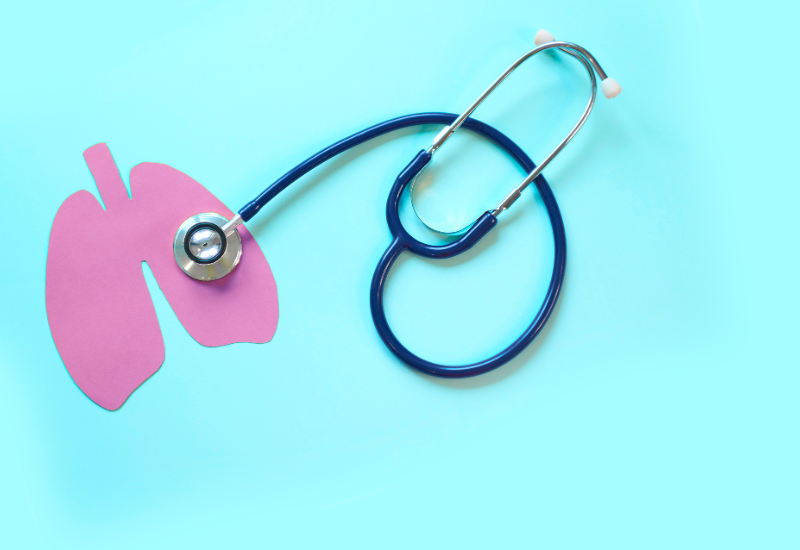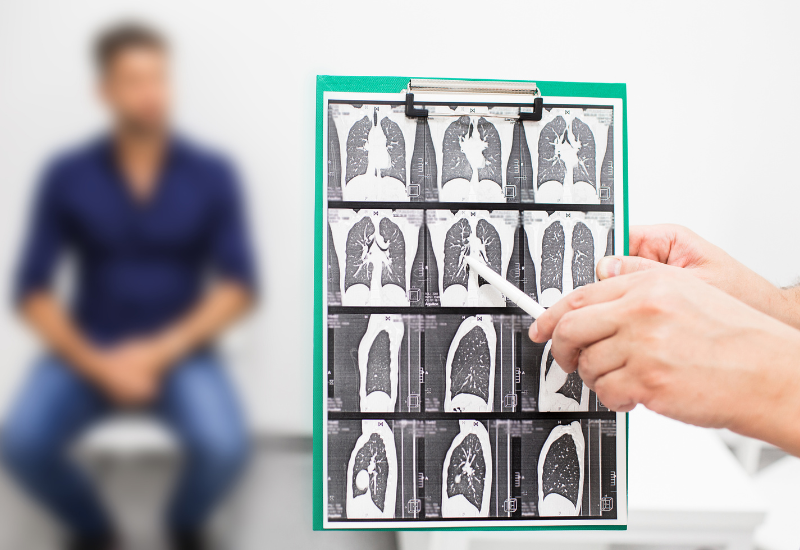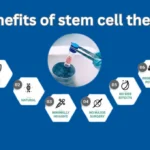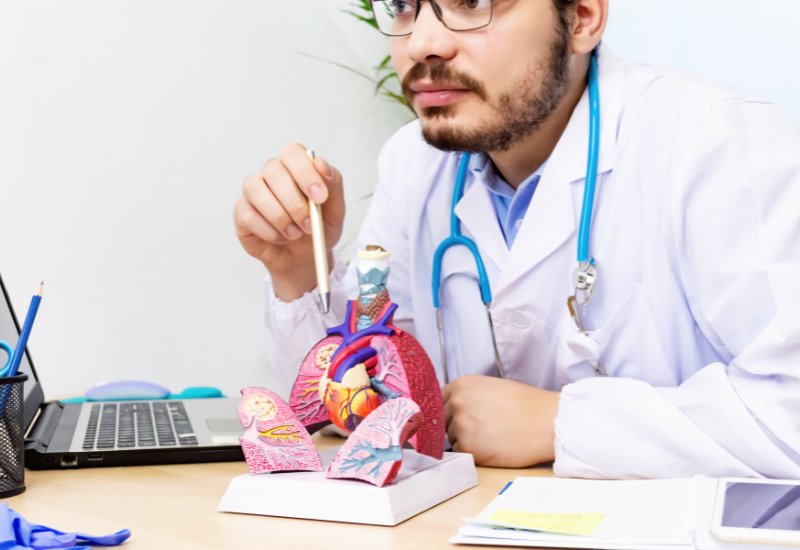Post-COVID Lungs Fibrosis Treatment by Stem Cells at IRM Hospital
In the aftermath of the global COVID-19 pandemic, a significant number of survivors are grappling with long-term complications, among which lung fibrosis has emerged as a critical concern. Characterized by the thickening and scarring of lung tissue, post-COVID lung fibrosis can severely impair respiratory function. IRM Hospital in Islamabad is leading the charge in addressing this challenge through innovative stem cell therapy, offering new hope for affected individuals.
Lung fibrosis post-COVID occurs when the disease triggers an abnormal healing process in the lungs, leading to the formation of scar tissue that hampers the organs’ ability to function properly. Symptoms can range from shortness of breath and fatigue to severe respiratory distress, significantly impacting the quality of life.


The Role of Stem Cell Therapy
Stem cell therapy has emerged as a promising approach for treating a variety of medical conditions, including lung fibrosis. Stem cells possess the unique ability to differentiate into different cell types and promote tissue repair and regeneration. In the context of lung fibrosis, stem cells can target the damaged areas of the lungs, stimulate the growth of new, healthy tissue, and modulate the inflammatory response, thereby promoting healing and improving lung function.

IRM Hospital’s Innovative Approach
IRM Hospital in Islamabad is at the forefront of pioneering stem cell therapy for post-COVID lung fibrosis. Leveraging cutting-edge technology and expertise in regenerative medicine, the hospital offers personalized treatment plans tailored to each patient’s unique needs. The therapy involves the extraction of stem cells from the patient’s own body, typically from bone marrow or adipose tissue. These stem cells are then processed and re-injected into the lungs, where they exert their healing effects.

Comprehensive Evaluation and Diagnosis
IRM Hospital prioritizes a thorough evaluation process to accurately assess the extent of lung damage and formulate personalized treatment plans for each patient. Advanced diagnostic tools such as pulmonary function tests, imaging studies, and biomarker analysis are utilized to provide insights into lung function and tissue integrity.
Patient-Centered Care
and Support
At IRM Hospital, patient-centered care is paramount, with emphasis placed on open communication, shared decision-making, and compassionate support throughout the treatment journey. Patients and their families are actively involved in the care planning process, empowering them to make informed decisions about their health and well-being.
Precision & Advancement in Modern Treatments
comprehensive and personalized treatment plans
that address their unique needs and promote recovery from post-COVID lung fibrosis
In the quest to address the lingering effects of COVID-19 on respiratory health, medical professionals are continually exploring a wide range of treatment modalities beyond conventional pharmaceutical approaches. For individuals grappling with post-COVID lung fibrosis, a plethora of alternative and complementary therapies offer hope for improved respiratory function and overall well-being. Let’s delve into some of these innovative treatment options:
Post-COVID lung fibrosis refers to the scarring of lung tissue that occurs as a result of severe respiratory illness caused by the SARS-CoV-2 virus. Even after the infection has been cleared, some individuals experience persistent inflammation and damage to the lungs, leading to the formation of scar tissue. This scarring, in turn, can hinder the lungs’ ability to expand and contract properly, resulting in breathing difficulties and decreased oxygen uptake.
1. Integrative Medicine:
Integrative medicine combines conventional medical treatments with complementary therapies such as acupuncture, herbal medicine, and mindfulness practices. This holistic approach aims to address the physical, emotional, and spiritual aspects of healing, offering comprehensive support for individuals recovering from COVID-19-related lung fibrosis.
2. Nutritional Interventions:
Proper nutrition plays a crucial role in supporting lung health and tissue repair. Nutritional interventions tailored to the unique needs of individuals with post-COVID lung fibrosis can include supplementation with vitamins and minerals known to support respiratory function, as well as dietary adjustments to reduce inflammation and promote healing.
3. Physical Therapy:
Physical therapy focuses on improving mobility, strength, and endurance through targeted exercises and rehabilitation techniques. For individuals with post-viral lung fibrosis, physical therapy can help enhance respiratory muscle function, optimize breathing mechanics, and improve overall fitness levels.
4. Oxygen Therapy:
Supplemental oxygen therapy may be prescribed to individuals with severe or persistent respiratory symptoms due to lung fibrosis. This treatment modality provides the lungs with additional oxygen, alleviating breathlessness and improving exercise tolerance.
5. Herbal Remedies:
Herbal medicine offers a wealth of plant-based remedies with potential benefits for respiratory health. Herbs such as licorice root, mullein, and marshmallow may help soothe inflamed airways, reduce coughing, and promote lung healing in individuals recovering from COVID-19-related lung fibrosis.
6. Aromatherapy:
Aromatherapy harnesses the therapeutic properties of essential oils to promote relaxation, reduce stress, and alleviate respiratory symptoms. Inhalation of essential oils such as eucalyptus, peppermint, and lavender may help open up the airways, ease breathing, and enhance overall respiratory function.
7. Acupuncture:
Acupuncture, a key component of traditional Chinese medicine, involves the insertion of thin needles into specific points on the body to stimulate healing and restore balance. In the context of post-COVID lung fibrosis, acupuncture may help improve lung function, reduce inflammation, and alleviate symptoms such as coughing and shortness of breath.
8. Lifestyle Modifications:
Simple lifestyle changes, such as quitting smoking, maintaining a healthy weight, and practicing stress management techniques, can have a profound impact on lung health and overall well-being for individuals recovering from COVID-19-related lung fibrosis.
9. Pulmonary Rehabilitation:
A cornerstone of the treatment approach at IRM Hospital, pulmonary rehabilitation programs are tailored to each patient’s specific needs and may include exercise training, breathing exercises, nutritional counseling, and psychosocial support to optimize respiratory function and quality of life.
Multidisciplinary Care Approach
IRM Hospital adopts a multidisciplinary care approach, bringing together specialists from various fields including pulmonology, regenerative medicine, physical therapy, nutrition, and psychology to provide holistic and integrated care for individuals with post-COVID lung fibrosis. This collaborative effort ensures that patients receive comprehensive support addressing the physical, emotional, and psychological aspects of their condition.
Patient-Centered Care and Support
At IRM Hospital, patient-centered care is paramount, with emphasis placed on open communication, shared decision-making, and compassionate support throughout the treatment journey. Patients and their families are actively involved in the care planning process, empowering them to make informed decisions about their health and well-being. It ensures ehancements & growth in patient's lifestyle.
Benefits of Stem Cell Therapy
Stem cell therapy for post-COVID lung fibrosis offers several potential benefits:
Regeneration of Lung Tissue:
Stem cells have the ability to differentiate into various cell types found in the lungs, including alveolar cells responsible for gas exchange. By promoting the growth of new tissue, stem cell therapy can help repair the damage caused by fibrosis.
Anti-inflammatory Effects:
Stem cells produce bioactive molecules that modulate the immune response and reduce inflammation in the lungs. This can help alleviate symptoms such as coughing and shortness of breath.
Improved Lung Function:
By restoring normal lung architecture and function, stem cell therapy can enhance respiratory capacity and oxygenation, leading to improved quality of life for patients.
Minimally Invasive Procedure:
Stem cell therapy is typically performed as an outpatient procedure and involves minimal discomfort and downtime for patients.
The emergence of post-COVID lung fibrosis poses significant challenges for healthcare providers worldwide. However, with advancements in regenerative medicine, there is renewed hope for effective treatment options. Stem cell therapy, offered at IRM Hospital in Islamabad, represents a promising avenue for addressing the underlying causes of lung fibrosis and restoring respiratory health in individuals recovering from COVID-19.
IRM Hospital in Islamabad stands at the forefront of post-COVID lung fibrosis treatment, offering advanced therapeutic options, multidisciplinary expertise, and patient-centered care to individuals navigating the challenges of respiratory recovery. Through a combination of innovative therapies, personalized treatment plans, and compassionate support, IRM Hospital is dedicated to helping patients regain lung health and reclaim their quality of life in the aftermath of COVID-19.






